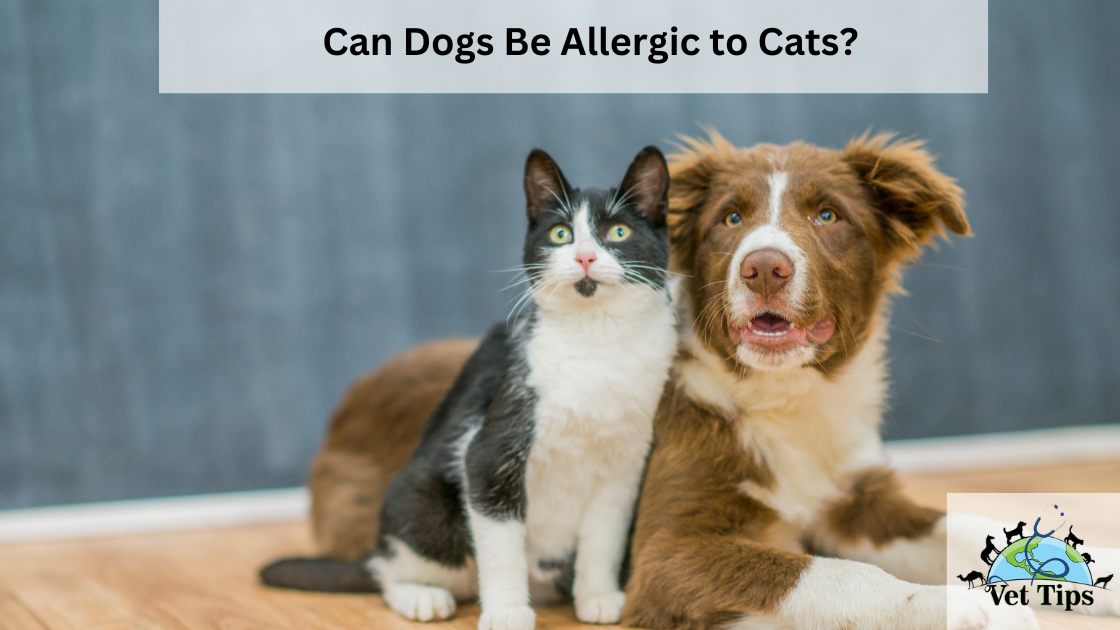You’ve been blessed with the presence of a canine companion in your home, and he or she has brought an incredible amount of happiness into your existence. And now you’re thinking about bringing an adorable and cuddly kitty buddy into the house with you. On the other hand, the thought keeps popping up in your head, “Can dogs be allergic to cats?” Let’s delve deeply into this fascinating issue and get to the bottom of what’s actually going on between our canine and feline companions!
Understanding Allergies in Dogs and Cats
Let’s get a basic understanding of what allergies are in our canine and feline friends before we dig into the question of whether or not dogs can be allergic to cats. When the immune system of a pet goes crazy and overreacts to chemicals it perceives as harmful, they can develop allergies. These compounds are known as allergens. These irritants can take the form of anything, from pollen and mold to certain meals and the bites of insects.
Comparative Analysis: Allergies in Dogs vs. Cats
Let’s look at how allergies manifest themselves in both dogs and cats, so we can get a better idea of how likely it is that a dog will be allergic to cats. It’s interesting to note that both species are capable of having allergic reactions, but the allergens that trigger reactions in each can be different.
Pollen, dust mites, and even specific foods can all be environmental allergens that can cause dogs to develop allergic reactions. Itching, rashes on the skin, sneezing, and even digestive problems are some of the most common symptoms. On the other hand, flea bites and specific foods are the most common allergens that cause cats to suffer from allergic reactions.
The Not-So-Purrfect Encounter: Dogs Allergic to Cats
Let’s move on to the more important subject at hand, which is whether or not dogs can develop an allergy to cats. To address your question in a nutshell: yes, it is doable! Certain dogs may, in fact, be sensitive to certain proteins that are present in cat dander, saliva, or urine; however, this allergy is not nearly as frequent as other types of dog allergies.
It is possible for a dog’s immune system to have a negative reaction when the dog comes into contact with allergens to which it is allergic. This could cause a variety of symptoms, including itching, redness, sneezing, and watery eyes in some people. It’s possible that poor Fido will get a bit uneasy when he’s around his feline pal.
A Tail of Two Allergens: Fel d 1 and Can f 1
Alright, let’s get a bit scientific here. The main culprits behind the dog-to-cat allergy connection are two proteins: Fel d 1 and Can f 1.
- Fel d 1: This protein is found in cat saliva and skin glands, making its way onto cat fur when they groom themselves. When the cat sheds its fur, Fel d 1 can become airborne and settle on surfaces around the house.
- Can f 1: In contrast, dogs produce Can f 1, which is present in their skin and saliva. It’s similar to Fel d 1, and some dogs may find it irritating.
Graphs and Tables: Allergy Incidence in Dogs
Let’s take a look at some data on the occurrence of allergies in dogs to gain a clearer picture:
| Dog Allergy Types | Prevalence Among Dogs |
| Environmental Allergies | 10-15% |
| Food Allergies | 5-10% |
| Dog-to-Cat Allergies | Less common |
As we can see, dog-to-cat allergies are relatively less common compared to other types of allergies in dogs. But it’s crucial to remember that every dog is unique, and some may be more prone to this type of allergy than others.
Storytime: A Furry Friendship Put to the Test
I’d like to tell you a story that will warm your heart about a dog named Max and a cat named Whiskers who were best friends. Since they were itty-bitty balls of fur, Max, a joyful Labrador, and Whiskers, a beautiful Siamese cat, were inseparable companions.
However, as the siblings continued to age, Max began exhibiting signs of uneasiness whenever Whiskers was in the same room. His nose would run, he’d get itchy all over, and his eyes would start to water. Sarah, their human, was worried about Max, so she took him to the veterinarian.
Following a series of tests, the veterinarian determined that Max had developed a sensitization to the dander that Whiskers shed. Sarah was upset by this revelation, but she was resolved to help her pets live peacefully together despite their differences.
FAQs
Can dog-to-cat allergies go away on their own?
It is possible that a dog’s sensitivity to cats will reduce over time, particularly if the dog is exposed to cats on a regular basis. However, it is imperative that you keep an eye on your dog’s health and seek the counsel of a veterinarian if the symptoms continue or get worse.
Can I give my dog allergy medication?
Absolutely! Your canine friend may find some relief from his or her allergies with the use of several drugs that are available both over-the-counter and by prescription. Before giving any medication to your dog, you should always seek the advice of your veterinarian first.
How can I reduce allergens at home?
It is important to make sure that your pets are routinely groomed and bathed so that allergens can be reduced. You should use air purifiers, vacuum your home periodically, and wash your pet’s bedding. Additionally, preventing your dog and cat from entering the bedroom as well as other sensitive areas of the house can be of assistance.
Conclusion
In conclusion, it is possible for dogs to be allergic to cats due to particular proteins that are present in cat saliva and dander. However, this is a rather uncommon occurrence. To better appreciate the one-of-a-kind qualities of each pet, it is helpful to have a better understanding of how allergies manifest in dogs and cats. Do not be concerned in the event that your canine companion develops an allergy to your feline pal. They are able to coexist peacefully as long as they are managed and cared for appropriately, much as Max and Whiskers.
Remember to keep a close watch on the health of your dogs at all times and to contact your veterinarian if you observe any signs that could be cause for worry. Alongside you, your four-legged pals can continue to bring happiness and coziness into your home as long as they are showered with love, care, and possibly some additional TLC!
Tell us in the comments, how you like our article “Can Dogs Be Allergic to Cats?”
For similar posts like this, click here.
For the source file, click here.




